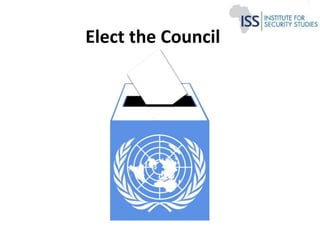
Elect the council 2015
- 2. 2015: Use think tanks & academics to help develop realistic & equitable proposals to help unblock the impasse on UNSC reform 2016 + : Mobilize civil society to pressure for movement towards an UNGA resolution to amend the UN Charter Principle: (regional) elections to the UNSC based on minimum criteria and 15-year transition for the P5 In summary
- 3. Why? • Deadlock • No perfect moment… • Global change is unstable • UNSC at the heart of global security governance • Since 2010 global increase in violence including terrorism • We can wait for a global crisis or accompany power shifts • In an integrated & crowded world an inclusive and cooperative security paradigm is a prerequisite for economic growth
- 4. Version 3 After UNGA resolution Ratification at national level 15-year transition period A normalized UNSC
- 5. First 15 years: 26 members 5 countries elected for 5 yr terms (renewable ) 16 countries elected for 3 yr terms China, France, Russia, UK, USA
- 6. After 15 years: 24 members 8 countries elected for 5 yr terms (renewable) 16 countries elected for 3 yr terms
- 7. Why 24 members? One 5-year and two 3-year seats for every 22 countries in each of the five regional groups that elect current non- perm seats
- 8. Current Electoral Regions • Eastern European Group (EEG) of 23 members • Latin American and Caribbean Group (GRULAC) of 33 members • Western European and Others Group (WEOG) of 29 members plus USA as an observer • Africa group of 54 members • Asia-Pacific group of 53 members
- 9. Divide by 22
- 10. Why 26 during transition? Three P5 members in three 5-year seats Plus two additional seats
- 11. Minimum criteria Not all countries may want to or should serve on UNSC BUT Let regions manage
- 12. Regional criteria for candidates 1. Experience and capacity 2. Financial good standing with UN and agencies 3. Willingness to share additional financial burden as determined by GA 4. Respect for open, inclusive and accountable governance, the rule of law and international human rights standards
- 13. Within the UNSC • Each seat has one vote (except P5 during 15 years of transition) • Both procedural and substantive issues require a two-thirds affirmative vote • Parties to a conflict may be heard but may not vote • Thus no veto
- 14. Transitional measures for P5 (15 yrs) • Option A: Each P5 vote counts as four votes (years 1-5), three votes (years 6-10) and two votes (years 11-15). So 26 members but 41, 36 and 31 votes • Option B: Minimum number of current P5 must support each decision. Three in years 1- 5; two in years 6-10; one in years 11-15
- 15. What about ‘time-out’ on key intractable problems? Such as Kashmir?
- 16. Not presented • Details on options for voting during 15 year transition • Staggered electoral process • Process to get to agreed Rules of Procedure • Periodic review
- 17. WRAPPING UP
- 19. The P5 do not want change! Only chance is if 129 countries in the UNGA unite around a set of detailed proposals This requires a change in mind-set
- 20. A different mind-set? • Collaborative security in a hot, flat and crowded world • A UNSC that deals with (truly) global issues • Elected countries that serve regional interests
- 21. Watch the video on the website at www.electthecouncil.org
- 22. Next steps • This version 3 • Help shape = Comment! • Spread the word … e-mail, social media, etc • Like on Facebook, comment on website, join the campaign on www.change.org • Please lobby and support in 2016
- 23. For more information visit www.electthecouncil.org or www.facebook.com/ElecttheCouncil #ElectTheCouncil #UNSCreform
Editor's Notes
- UNSC reform in New York is completely deadlocked – in an interconnected world civil society leg role (landmines, ICC, etc) There will never be a perfect moment… The world is changing - rate of change is unstable Since 2010 increase in violence and global, interconnected threats are on the rise 21st century will be lead by USA, China, India and possibly EU (pending deeper integration) Need for global responses to global challenges, eg nuclear proliferation, terrorism, cybercrime We can wait for a global crisis or accompany shifts UNSC at the heart of global governance – lack of reform poisons the entire system MOST IMPORTANT: legitimacy and effectiveness
